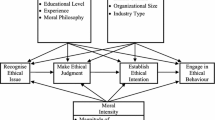Abstract
Research into the ethical disposition of students hasbeen popular in recent years. However, research intothe ethical disposition of accounting students inparticular has been sparse. Because of the uniquecharacteristics of those who choose to enter the fieldof accounting, generalizing findings of businessstudents to accounting students may not be valid. Consequently, additional studies of accountingstudents are useful.
This study investigates context (academic vs.business)-based and gender-based differences inaccounting students’ ethical intent. We find mixedsupport for gender-based mean differences; theseresults are consistent across context. With regard tocontext we find a greater variability in respondents’behavioral intent in an academic context relative toa business context. We also find gender-baseddifferences in how ethical issues are grouped (thatis, the perceived cognitive structure of ethicalissues). Implications of these findings are discussedwith particular interest relative to education.
Similar content being viewed by others
REFERENCES
Ameen, E., D. Guffey and J. McMillan: 1996, ‘Gender Differences in Determining the Ethical Sensitivity of Future Accounting Professionals’, Journal of Business Ethics 15, 591–597.
American Accounting Association Committee on the Future Structure, Content, and Scope of Accounting Education (AAA): 1986, ‘Future Accounting Education: Preparing for the Expanding Profession’, Issues in Accounting Education, 168–195.
Arens, A. A. and J. K. Loebecke: 1994, Auditing: An Integrated Approach, Prentice Hall, Inc., Englewood Cliffs, NJ.
Betz, M., L. O'Connell and J. Shepard: 1989, ‘Gender Differences in Proclivity for Unethical Behavior’, Journal of Business Ethics 3, 321–324.
Borkowski, S. C. and Y. J. Urgas: 1998, “Business Students and Ethics: A Meta-Analysis’, Journal of Business Ethics 17, 1117–1127.
Cohen, J., L. Pant and D. Sharp: 1998, ‘The Effect of Gender and Academic Discipline Diversity on the Ethical Evaluations, Ethical Intentions and Ethical Orientation of Potential Public Accounting Recruits’, Accounting Horizons 12(3), 250–270.
Daidone, J.: 1992, The Supply of Accounting Graduates and the Demand for Public Accounting Recruits, AICPA, New York, NY.
Dirsmith, M. and E. Ketz: 1987, ‘A Fifty-Cent Test: An Approach to Teaching Integrity’, Advances in Accounting 5 (ed. B.N. Schwartz), 129–144.
Fulmer, W. E. and B. R. Cargile: 1987, ‘Ethical Perceptions of Accounting Students: Does Exposure to a Code of Professional Ethics Help?’, Issues in Accounting Education, 207–219.
Geiger and O'Connell: 1999, ‘Accounting Student Ethical Perceptions: An Analysis of Training and Gender Effects’, Teaching Business Ethics, 371–388.
Gilligan, C.: 1982, In a Different Voice: Psychological Theory and Women’ Development, Harvard University Press, Cambridge MA.
Green, S. and J. Weber: 1997, ‘Influencing Ethical Development Exposing Students to the AICPA Code of Conduct’, Journal of Business Ethics 16, 777–790.
Grobstein, M., S. E. Loeb and R. D. Neary: 1985, Auditing: A Risk Analysis Approach, Richard D. Irwin, Inc., Homewood IL.
Horngren, C. T., G. Foster and S. M. Datar: 1998, Cost Accounting: A Managerial Emphasis, Prentice Hall, Inc., Upper Saddle River, NJ.
Kieso, D. E. and J. J. Weygandt: 1998, Intermediate Accounting, 9th edn., John Wiley and Sons, Inc., New York, NY.
Knapp, M. C.: 1993, Contemporary Auditing Issues and Cases, West Publishing Company, St. Paul, MN.
Kohlberg, L.: 1984, Essays on Moral Development, Harper and Row, San Francisco, CA.
Loeb, S. E.: 1991, ‘The Evaluation of “Outcomes” of Accounting Ethics Education’, Journal of Business Ethics 10, 77–84.
McCuddy, M. K. and B. L. Peery: 1996, ‘Selected Individual Differences and Collegians’ Ethical Beliefs’, Journal of Business Ethics 15, 261–272.
Meigs, W. B., E. J. Larsen and R. F. Meigs: 1977, Principles of Auditing, 6th edn., Richard D. Irwin, Inc., Homewood IL.
Mintz, S. M.: 1990, Cases in Accounting Ethics and Professionalism, 1st edn., McGraw Hill Inc., New York, NY.
Mintz, S. M.: 1997, Cases in Accounting Ethics and Professionalism, 3rd edn., McGraw Hill Inc., New York, NY.
National Commission on Fraudulent Financial Reporting (Treadway Commission): 1987, Report of the National Commission on Fraudulent Financial Reporting.
Schwartz, F.: 1996, ‘The Competitive Advantage: Recruiting and Retaining Women Accountants’, Journal of Accountancy (February), 39–41.
Stanga, K. and R. Turpen: 1991, ‘Ethical Judgments on Selected Accounting Issues: An Empirical Study’, Journal of Business Ethics 10, 739–747.
Tyson, T.: 1990, ‘Believing that Everyone Else is Less Ethical: Implications for Work Behavior and Ethics Instruction’, Journal of Business Ethics 9, 715–721.
Windal, F. W.: 1991, Ethics and the Accountant: Text and Cases (Prentice Hall, Inc., Englewood Cliffs, NJ).
Author information
Authors and Affiliations
Rights and permissions
About this article
Cite this article
Coate, C.J., Frey, K.J. Some Evidence on the Ethical Disposition of Accounting Students: Context and Gender Implications. Teaching Business Ethics 4, 379–404 (2000). https://doi.org/10.1023/A:1009827807550
Issue Date:
DOI: https://doi.org/10.1023/A:1009827807550




